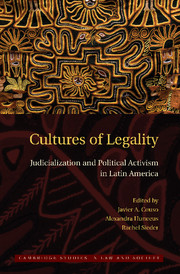Book contents
- Frontmatter
- Contents
- Contributors
- PART I INTRODUCTION
- PART II COURTS AND JUDICIALIZATION THROUGH A CULTURAL LENS
- PART III JUDICIALIZATION BEYOND THE COURTS
- 6 The Transformation of Constitutional Discourse and the Judicialization of Politics in Latin America
- 7 Legal Cultures in the (Un)Rule of Law: Indigenous Rights and Juridification in Guatemala
- 8 Political Activism and the Practice of Law in Venezuela
- 9 The Mapuche People's Battle for Indigenous Land: Litigation as a Strategy to Defend Indigenous Land Rights
- 10 Judicialization in Argentina: Legal Culture or Opportunities and Support Structures?
- 11 Novel Appropriations of the Law in the Pursuit of Political and Social Change in Latin America
- Index
- CAMBRIDGE STUDIES IN LAW AND SOCIETY
- References
10 - Judicialization in Argentina: Legal Culture or Opportunities and Support Structures?
Published online by Cambridge University Press: 20 May 2010
- Frontmatter
- Contents
- Contributors
- PART I INTRODUCTION
- PART II COURTS AND JUDICIALIZATION THROUGH A CULTURAL LENS
- PART III JUDICIALIZATION BEYOND THE COURTS
- 6 The Transformation of Constitutional Discourse and the Judicialization of Politics in Latin America
- 7 Legal Cultures in the (Un)Rule of Law: Indigenous Rights and Juridification in Guatemala
- 8 Political Activism and the Practice of Law in Venezuela
- 9 The Mapuche People's Battle for Indigenous Land: Litigation as a Strategy to Defend Indigenous Land Rights
- 10 Judicialization in Argentina: Legal Culture or Opportunities and Support Structures?
- 11 Novel Appropriations of the Law in the Pursuit of Political and Social Change in Latin America
- Index
- CAMBRIDGE STUDIES IN LAW AND SOCIETY
- References
Summary
Since 1983, Argentina has experienced a process of judicialization of conflicts and of juridification of social interactions. Why and when did people turn to the law? Are these processes associated with changes in legal culture? Are they related to modifications of the opportunity structure for rights claiming? Alternatively, are they explained by the existence of support structures for legal mobilization? This chapter will argue that judicialization in Argentina is not related to ex ante changes in legal culture, but rather to the combined effects of changes in opportunity structures for claim making and the earlier emergence of a support structure for legal mobilization consisting of labor lawyers and a new rights advocacy network of nongovernmental organizations (NGO). These two developments resulted in an increase in the judicialization of claims insofar as they transformed legal demands into a strategic political tool.
INTRODUCTION
In many parts of the world, courts and the law are playing an increasingly important political role. Courts are redefining public policies decided by representative authorities, and citizens are using the law and rights-framed discourses as political tools to address private and social demands, as well as to govern everyday social interactions previously regulated by cooperation, trust, or kinship. This increased use of legal procedures and rights-framed discourses is taking place in various forms and places and has given birth to a growing literature on the judicialization of politics. Argentina is not exempt from this process.
- Type
- Chapter
- Information
- Cultures of LegalityJudicialization and Political Activism in Latin America, pp. 234 - 253Publisher: Cambridge University PressPrint publication year: 2010
References
- 11
- Cited by

